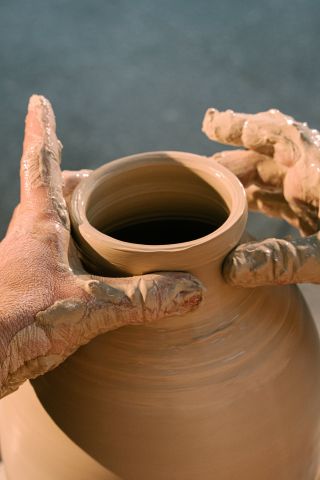Creativity
Develop a Creativity Habit and Get More Out of Life
A habit of creativity may boost your well-being and confidence.
Posted December 10, 2023 Reviewed by Abigail Fagan

Most people are more creative than they realize. The problem is they believe creativity is a gift only a few people are born with. Creativity is actually a skill that anyone can develop at any age. A great way to gain that skill is to develop a creativity habit.
With this habit you'll enjoy many benefits including better mental and physical health. You may also reap financial rewards from it as well. But the main benefit is that creativity makes you feel good. It's fun and relaxing. And when you get engrossed in it, time just disappears.
I discovered this by accident. You see, I have two careers: writing and speaking, both of which required me to do creative thinking on a regular basis.
As a professional writer, I mostly write advertising copy. When I first started I would rewrite existing advertising headlines on a daily basis as an exercise to develop my creative ability. Over time it became a habit. I still do this today like second nature. If I see an ad with a failing headline, in my head I'll revise it to be how I think it should’ve been written.
As a speaker I like to add humor to my presentations which means I create jokes that are relevant to the audience. This is part of the effort I make when I write a speech for a particular organization. However, in order to be prepared for when I’m hired, I make it a point to find comedy in everyday situations wherever I go: out to eat, shopping, or the gas station.
I’ll make a joke that’s germane to that place and time even if there’s only one other person to entertain. It’s even more fun when I encounter someone else who likes to be funny too and they respond with a crack of their own. Then it’s Improv-at-the-Grocery-Check-Out-Line. I enjoy making people laugh so much that it’s become a creative habit.
Developing a creativity habit teaches you to look at things in different ways which is a key component in creative thinking. Albert Gyorgyi, the Nobel Prize winning scientist who discovered vitamin C, observed: “Discovery consists of seeing what everybody has seen and thinking what nobody has thought.” In other words, when you get a different perspective, you are more likely to see creative opportunities.
The good news is you don’t have to be in a creative career to develop the habit of creativity and enjoy all its advantages.
Creativity Can Improve Health and Happiness
The benefits of developing a creativity habit begin with the mental stimulation you’ll enjoy. When you do something for the first time you lay down new neural pathways in your brain. This is called neuroplasticity, and when you learn or experience something new you create new connections between brain cells and open new channels of thought. The more you do that activity you strengthen and reinforce those neural pathways which makes it easier to do each time. In other words, the more you practice creativity, the more creative you will become.
Research shows that creativity improves happiness and well-being. Here’s how the science of developing a creativity habit will make you feel good: novel experience triggers the brain’s reward system, which produces dopamine, a neurotransmitter and hormone that elevates mood, motivation, and focus. You'll just notice the pure joy of creating something. In my experience there is nothing more gratifying or exhilarating than being enmeshed in the creative process.
Other studies demonstrate that engaging in creativity improves mental health. Creativity can reduce anxiety, depression, and stress. It also helps some people process trauma. When you are in the creative process all else recedes; your stress and problems are gone for the time being. You simply cannot be worried and create at the same time.
Regular involvement in creativity improves your physical health as well. A study by the National Endowment for the Arts determined that older adults participating in creative arts programs had fewer visits to the doctor, fewer falls, and took fewer prescription and over-the-counter drugs than the non-participating (control) group. Creativity has also been shown to improve pain management, boost the immune system, and lower heart rate.
Work Creativity Into Your Daily Schedule
Creativity, however, does take time. I suggest routinely scheduling time to break out of your routine. Now I know that sounds like a contradiction but hear me out. In order to be creative, we need to refresh our brains. You can do this by going for a walk, soaking in a bath, riding a bus or train, daydreaming, or meditating. You can also do this by finding a repetitive task that doesn’t require any thinking. For example, I find mowing the lawn or blowing leaves to be such an activity. I can clear my thoughts and open my mind to whatever wants to pop into it. This works so well that it helps to keep a pad and pen handy so you can jot down emerging ideas.
Next schedule time to be creative. After your brain clearing activity spend some time doing one of your favorite creative activities: drawing, painting, sculpting, dancing, play-acting, composing music, coloring in a coloring book, sewing, knitting, making recipes, gardening and garden design, woodworking, or writing (poetry, stories, or in your journal). If you get an idea while on your brain clearing activity, then spend some time working on that.
A Creativity Habit Can Influence All Areas of Your Life
Once you’ve established a habit of creativity you’ll find yourself using it throughout your day in all or most of your activities: work, play, hobbies, cooking, cleaning, and raising children. Your daily practice will prepare you to recognize opportunities for fun and fortune.
My habit of creativity has bled into other areas of my life such as cooking where I will modify a recipe or create my own from scratch. I’ve also found that I’m a better problem solver and I discover little short cuts and efficiencies that smooth out my day.
You can find ways to be creative everywhere. When you make a beautiful home environment for you and your family that is creativity; and when you plan a party for your friends that is creativity too. When you step back and look at what you've made, your creation can give you a sense of accomplishment, and a feeling of pride. The success you experience can also increase your self-confidence.
A Creativity Habit Can Make You More Productive
Your creativity habit may help you in your career by giving you money making ideas or enable you to be more productive. According to a study by Adobe, companies that encourage creativity are 3.5 times more likely to outperform their competitors in terms of revenue growth. The Harvard Business Review found that companies encouraging creativity were more likely to report a strong market position and competitiveness than their non-creative counterparts.
An additional way you can build your creativity habit is to nurture your curiosity as a daily exercise. Use your curiosity to question authority and challenge the status quo, and come up with new ways of doing things.
Spend your time breaking out of your routine and schedule some fun creative activities. To sum it all up: clear your mind, find the silence, and allow your mind to expand and create.
References
https://www.newportacademy.com/resources/empowering-teens/creativity-an…
The Link Between Creativity and Mental Health
https://www.ncbi.nlm.nih.gov/pmc/articles/PMC8305859
Being Creative Makes You Happier: The Positive Effect of Creativity on Subjective Well-Being
https://doi.org/10.1080/07421656.2012.683748
The Influence of Art Making on Anxiety: A Pilot Study
https://psycnet.apa.org/record/2014-04641-001
Everyday creativity in daily life: An experience-sampling study of “little c” creativity.
https://www.researchgate.net/publication/281426150
Creative Days: A Daily Diary Study of Emotion, Personality, and Everyday Creativity
https://www.forbes.com/sites/ashleystahl/2018/07/25/heres-how-creativit… Here's How Creativity Actually Improves Your Health
https://www.lifeline.com/blog/aging-well-the-health-benefits-of-creativ…
Aging Well: The Health Benefits of Creativity
https://www.medicalnewstoday.com/articles/320947
What are the health benefits of being creative?
Kaczmarek B. Current views on neuroplasticity: What is new and what is old?. Acta Neuropsychologica. 2020;18(1):1-14. doi:10.5604/01.3001.0013.8808




